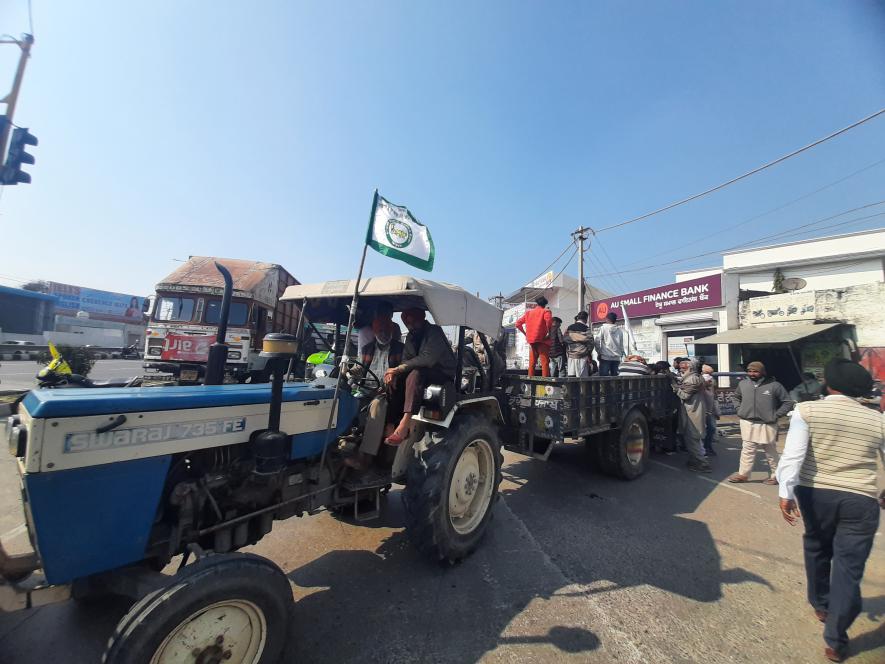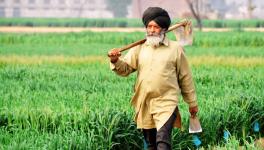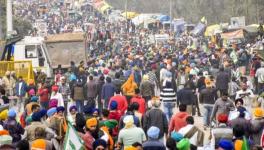Gurudwaras in Punjab Turn into Nerve Centres of Farmers’ Agitation

representational image.
“I am leaving for Dilli border tonight,” said Gurvinder Singh, a lanky young man in his late 20s, from Bhangi Nihal Singh village of Punjab’s Bathinda district. He is flanked by two men who are flipping through a Punjabi newspaper to read the latest news on the ongoing farmers’ protest. Earlier in the day, an announcement was made from the local gurudwara about the items to be sent to the Delhi borders. The announcement said, “Whoever wishes to contribute should assemble outside the Gurudwara.”
In the evening, truckloads of raw materials including wood, vegetable and milk were loaded onto the trolley to be sent to the borders. This is the third time Gurvinder is leaving for Tikri border. He said that villagers from his place visit the borders on rotational basis and this process has been ongoing since November last year.
“In our village, seven villagers visit the borders for seven days who are then replaced by another batch of seven villagers,” he told NewsClick.
A spirit of renewed camaraderie pervades the wintry air of rural Punjab these days, an indicator of what’s nurturing the prolonged protests at the borders of the national capital. A journey through Punjab’s villages provides interesting insights into sustained collective efforts of the rural communities.
From ensuring regular reinforcements of men and material to the raging farmers' agitation at the Delhi borders to supporting the families of the local farmers participating in those protests, local gurdwaras have become village-level nerve centres for the agitation against the three controversial farm laws, which the villagers allege will only serve anti-farmer and pro-corporate interests.
In Quila Nau village of Punjab’s Fardikot district, 70-year-old farmer and sarpanch, Jarnayal Singh, maintains a register of the villagers departing to and arriving from the protest site. The register helps him to keep a track of those participating so that no one goes missing. He said that after the Republic Day incident, when many protesters went missing, he has become more vigilant.
“They can put us behind the bars but they can’t silence us. As long as Modi keeps ignoring our demands, we will keep sending our men,” said Singh, while patting a young boy sitting next to him.
Singh agrees that the gurudwaras have played a huge role in sustaining the movement. “One single announcement from a gurudwara and it reaches everyone. We don’t have to go from door to door,” he told NewsClick.
Also read: Farmers’ Stir Swaying Punjab Civic Body Polls; BJP Members Fight as Independents
Not only that, last year, when the three agricultural laws were passed in Rajya Sabha, an awareness drive was launched where in gurudwaras became the centres of education. As per the villagers, announcements were made thrice a day educating people about the laws and its impact on the farmers.
“While leaders and activists visiting villages would mobilise and educate people, gurudwaras had a different impact on them. Villagers used to carefully listen to the information given out by the gurudwaras,” said Gurvinder.
While aspersions are being cast by certain sections about how the farmers’ movement is sustaining at the borders for so long, one look at the villages of Punjab provides the answer.
In the villages of Malwa region of Bathinda, where the movement is more pronounced, apart from raw materials, the farmers are contributing money per acre of landholding. For each acre of landholding, a contribution of Rs 200 is made. Notably, in different villages, the price per acre varies as decided between the villagers. The donations are noted and a slip is also provided to those who contribute.
“Nobody is forced. Everyone gives generously in support of the farmers’ movement. For them, its like an offering made at the gurudwara to protect their farms,” said Hardev Singh, a farmer and member of the All India Kisan Sabha, one of the farmers’ organisations which has been at the forefront of the farmers’ protest.
In other villages, farm unions are spending from their funds which they collect bi-annually from the villages. In Wara Bhaika village in Punjab’s Faridkot district, the bi-annual funds collected by the farm unions over the years have been spent already. “Punjab has a culture of protests. Every year, funds are collected by the unions. The same fund are used during the protest. In our village, the fund has been used to fuel the tractors leaving to borders every day,” he told NewsClick.
However, strict instructions are being given to those who are leaving for the borders of Delhi. Kaur, whose husband, Mohan, is the Bharatiya Kisan Union chief in the village said that clear instructions have been given that anyone found consuming drugs or participating in any untoward activity will be chastised in front of the entire village.
In Aulia village of Punjab’s Gurdaspur, contribution has been made twice since the movement started last year in November. Rajinder Singh, who has just returned from Singhu border, said, “The contribution goes to fuel the tractors. Every day 5-6 tractors are leaving from each village. Around Rs 20,000 per tractor is required in a to and fro journey. A lot of hard work has been put in to sustain the movement.”
Commenting on the farmers’ resentment, Rajinder said, “Modi thought he is offering us a gift, but we said we didn’t like this gift. We don’t want it. Then why is he forcing this gift on us? Is this a gift for us or him?”
In Lehra Mohabbat village of Bathinda district, Kalvinder Kaur is cleaning cotton while sitting on a charpoy. She separates the small brown stem and throws it in a disfigured bin, while the separated cotton is kept at a corner on the cot. Her husband and son visit the borders on rotations while Kaur attends to the fields. In the absence of men, who are participating in the protest, women, who are staying back, are juggling between household chores and farming.
“We are equal stakeholders. The earnings made from the farm produce affect our kitchen. So, I am happy that my son and husband are there. I told them to come back only when the farm laws are repealed. I will take care of everything here,” she added.
Further, Kaur also joins the vigil site at Lehra-Bega toll plaza everyday from 12 noon to 3 PM to protest against the farm laws. Every morning few tractors leave from the village to the protest site. “I travel in those tractors with other women while singing Inquilabi songs. Khet ve sambhalne haige, aandolan ve sambhalna aae (We have to look after the fields and also the ongoing movement),” she said, asserting that they are equally part of the protest.
While everyday villagers are leaving to participate in the protests at the borders, a sustained movement is also ongoing across Punjab. As reported by NewsClick earlier, farmers in Punjab have blocked toll plazas and businesses like Best Price and the ones owned by Mukesh Ambani and Gautam Adani.
The aroma of freshly cooked food wafts across these vigil sites. Every day, protesters in hundreds gather to observe sit-ins at these protest sites across Punjab’s Malwa, Majha and Doaba regions from 11 AM to 5 PM to press for their demands.
Get the latest reports & analysis with people's perspective on Protests, movements & deep analytical videos, discussions of the current affairs in your Telegram app. Subscribe to NewsClick's Telegram channel & get Real-Time updates on stories, as they get published on our website.
























